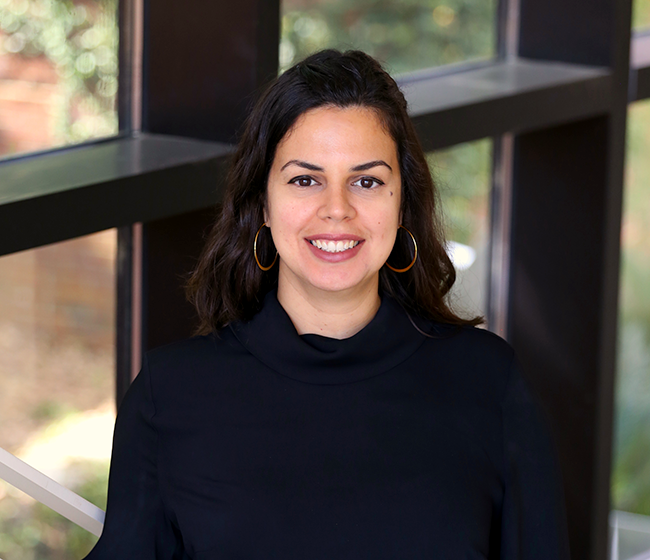
A groundbreaking new book, “Latin* Students in Engineering: An Intentional Focus on a Growing Population” co-edited by Lara Perez-Felkner, professor of higher education at the FSU College of Education, Health, and Human Sciences, was officially released in July by Rutgers University Press. The book, which explores the experiences and challenges of Latin* students in engineering, is gaining national attention and garnered praise from luminaries in STEM, engineering, and higher education fields.
The book’s contents span 300 pages and draw on the collective expertise of its three editors in higher education and STEM. Co-editors of the book are Sarah Rodriguez, associate professor of engineering education at Virginia Tech, and Ciera Fluker, a 2023 Higher Education Ph.D. alumna from FSU. Together, the trio created a resource that could help to amplify the voices of Latin* students in one of the most demanding and underrepresented fields: engineering.
According to Perez-Felkner, the book’s development has been a continuous effort since 2021, when the initial concept for the project came together.

“For me, the book began with an interest I had for years – to assemble a team of case studies and authors on cross-disciplinary research on understudied and underrepresented populations in STEM fields,” said Perez-Felkner.
She and Rodriguez chose to focus on Latin* populations because the student population is achieving at a high level and excelling in a field where they remain underrepresented.
“We wanted to make them visible,” Perez-Felkner said. “We also wanted to lift up and connect researchers who work through marginalization and disciplinary silos to investigate innovation and the hard work that goes into intervention research to improve programs and institutions.”
Both Perez-Felkner and Rodriguez have been conducting engineering education research for several years and share personal and professional interests in contributing to research on Latin* students. Fluker extended her graduate research assistantship with Perez-Felkner on engineering education and training to her own Ph.D. dissertation work at FSU and continued expertise on pathways to and through the workforce.
“[Rodriguez] is Chicana from Texas, I'm Puerto Rican from New York, and [Fluker] is Afro-Latina with roots in Florida and Ohio. We had distinct regional and educational pathways to our own careers as well as our research on engineering student success,” Perez-Felkner said. “This book was a great opportunity for synergy and collaboration.”
Perez-Felkner’s research has long focused on improving educational outcomes for marginalized students, and the book is an extension of this work that can be applied in varying contexts. " This book is specific to structuring supports to help Latin* students succeed further in engineering, but it can also be extended to consider interventions and theories of action for supporting Latin* students in other fields, and other marginalized populations who are working towards success in areas where they have been and continue to be underrepresented.”
The book uses robust designs and evidence, but the authors worked intentionally to make the writing clear and actionable for readers across roles and disciplines, Perez-Felkner said.
The authors address some of the barriers Latin* students face in engineering education, from lack of representation to financial challenges and inadequate academic preparation and STEM coursework in high school.
“Engineering is a field that is notorious for being grueling, assigning low grades, having high in- and out-of-class workloads, and ideas around talent that can feel fixed and exclusionary for Latin* students who typically have less access to advanced mathematics and science opportunities in high school as compared to their peers,” she said.

The book also highlights the economic disparities that make it harder for Latin* students to succeed in fields like engineering, which often require unpaid internships or research hours.
“While not true of everyone, Latin* families are comparatively economically disadvantaged, which poses several challenges specific to engineering studies,” she said. “There are routine challenges associated with the intense workload, labs, and expectations that can be — or feel — incompatible with other commitments like paid work hours and well-being.”
By highlighting these barriers, the authors aim to provide insight into how institutions can better support Latin* students in engineering. “Our hope is that faculty, departments, and campuses with interest in engineering excellence could find a range of approaches and actionable implications from our chapters that might support their work at their own campuses,” Perez-Felkner said.
Through collaborations, Perez-Felkner and her co-editors were also able to unite researchers from different disciplines and levels of their careers. "It was rewarding to see the capacity and community being built across different fields, from senior researchers to graduate students and postdocs," she said.
The book's reception has been overwhelmingly positive so far, with copies selling out quickly at conferences. "People are talking about bulk orders and integrating the book into faculty retreats and classrooms," Perez-Felkner says. The editors plan to continue presenting the book at major conferences and are excited about its potential to shape ongoing discussions in the field.
“We wanted to make sure this is a book we could all feel proud of and share with others and display on the shelf,” Perez-Felkner said. “We have really done that, which is a wonderful feeling and shared accomplishment.”


